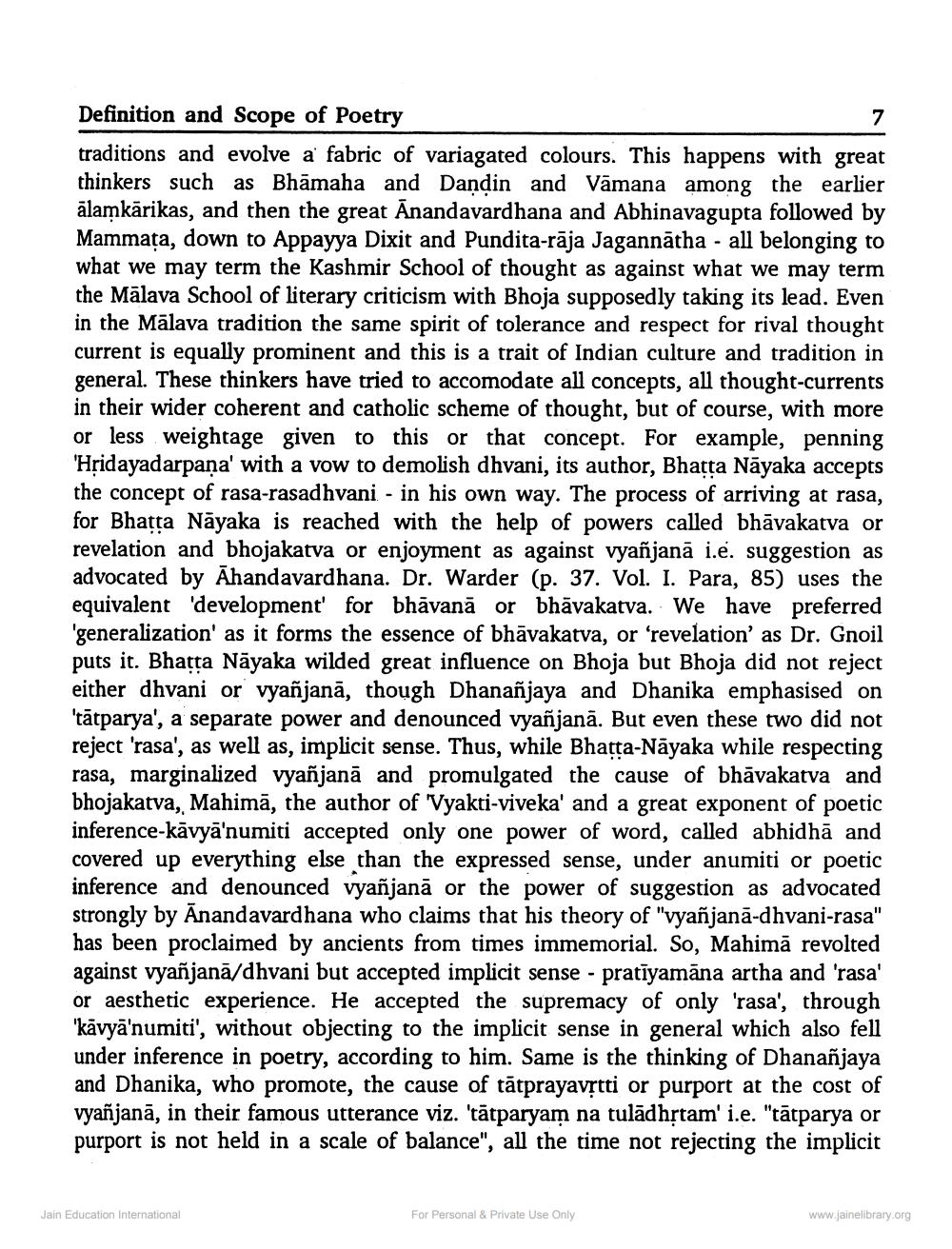________________
7
Definition and Scope of Poetry
traditions and evolve a fabric of variagated colours. This happens with great thinkers such as Bhamaha and Dandin and Vamana among the earlier ālamkarikas, and then the great Anandavardhana and Abhinavagupta followed by Mammata, down to Appayya Dixit and Pundita-rāja Jagannatha - all belonging to what we may term the Kashmir School of thought as against what we may term the Malava School of literary criticism with Bhoja supposedly taking its lead. Even in the Malava tradition the same spirit of tolerance and respect for rival thought current is equally prominent and this is a trait of Indian culture and tradition in general. These thinkers have tried to accomodate all concepts, all thought-currents in their wider coherent and catholic scheme of thought, but of course, with more or less weightage given to this or that concept. For example, penning 'Hridayadarpana' with a vow to demolish dhvani, its author, Bhatṭṭa Nayaka accepts the concept of rasa-rasadhvani - in his own way. The process of arriving at rasa, for Bhatta Nayaka is reached with the help of powers called bhavakatva or revelation and bhojakatva or enjoyment as against vyañjana i.e. suggestion as advocated by Ahandavardhana. Dr. Warder (p. 37. Vol. I. Para, 85) uses the equivalent 'development' for bhāvanā or bhavakatva. We have preferred 'generalization' as it forms the essence of bhavakatva, or 'revelation' as Dr. Gnoil puts it. Bhatta Nayaka wilded great influence on Bhoja but Bhoja did not reject either dhvani or vyañjanā, though Dhananjaya and Dhanika emphasised on 'tātparya', a separate power and denounced vyañjana. But even these two did not reject 'rasa', as well as, implicit sense. Thus, while Bhatta-Nayaka while respecting rasa, marginalized vyañjanā and promulgated the cause of bhavakatva and bhojakatva, Mahima, the author of 'Vyakti-viveka' and a great exponent of poetic inference-kāvyā'numiti accepted only one power of word, called abhidhā and covered up everything else than the expressed sense, under anumiti or poetic inference and denounced vyañjana or the power of suggestion as advocated strongly by Anandavardhana who claims that his theory of "vyañjana-dhvani-rasa" has been proclaimed by ancients from times immemorial. So, Mahima revolted against vyañjana/dhvani but accepted implicit sense - pratīyamāna artha and 'rasa' or aesthetic experience. He accepted the supremacy of only 'rasa', through 'kāvyā'numiti', without objecting to the implicit sense in general which also fell under inference in poetry, according to him. Same is the thinking of Dhananjaya and Dhanika, who promote, the cause of tatprayavṛtti or purport at the cost of vyañjanā, in their famous utterance viz. 'tātparyam na tuladhṛtam' i.e. "tātparya or purport is not held in a scale of balance", all the time not rejecting the implicit
Jain Education International
For Personal & Private Use Only
www.jainelibrary.org




